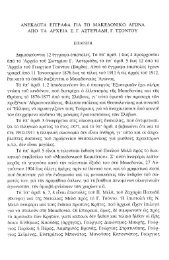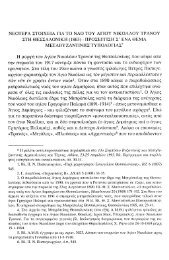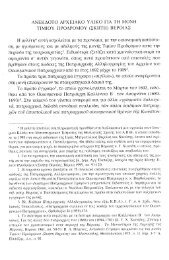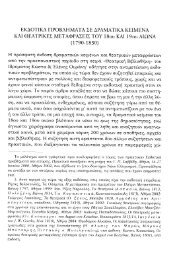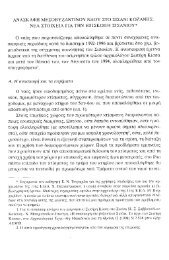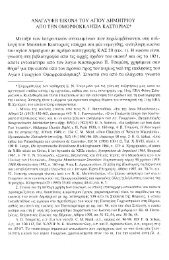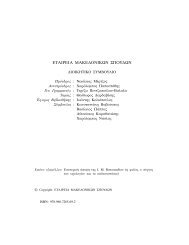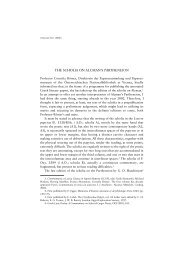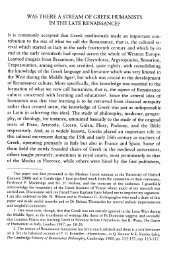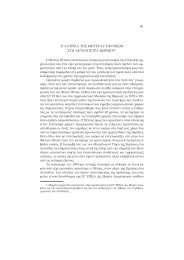GREEK EDUCATION IN MONASTIR - PELAGONIA
GREEK EDUCATION IN MONASTIR - PELAGONIA
GREEK EDUCATION IN MONASTIR - PELAGONIA
You also want an ePaper? Increase the reach of your titles
YUMPU automatically turns print PDFs into web optimized ePapers that Google loves.
<strong>GREEK</strong> <strong>EDUCATION</strong> <strong>IN</strong> <strong>MONASTIR</strong> - <strong>PELAGONIA</strong> 13<br />
and aggravations. Their fight against propaganda in the educational, ecclesiastical<br />
and ideological spheres was incredibly vigorous and tenacious, and<br />
found expression both in armed conflict and in countless protests to the<br />
Ecumenical Patriarchate in Constantinople and the leaders of the European<br />
Great Powers of the day. The Ecumenical Patriarchate, for its part, provided<br />
substantial help to the Greek population of Monastir and its environs, both<br />
as part of its general assistance to the Greeks in the enslaved territories and,<br />
especially after the emergence of organised Romanian propaganda, with the<br />
aim of strengthening Greek ideology and binding the Christian population<br />
together as a single body in the face of the danger from the Bulgarian Exarchate<br />
and Western Catholic propaganda.<br />
5. One important facet of the educational, intellectual and spiritual<br />
situation in Monastir was the cultural phenomenon of a single-minded, public-spirited<br />
popular base that competed in the performance of good works,<br />
offering whole-hearted national and financial service through the creation of<br />
dozens of national, educational and philanthropic societies, associations and<br />
fraternal organisations. These entities substituted for the non-existent official<br />
state welfare and protection, which was absent to such a point that it<br />
was impossible to determine the agency or authority which would have<br />
guaranteed their activity. In this sense, then, the admirably organised and<br />
smoothly operating Greek education system, on the one hand, with its famous<br />
schools, excellent teachers and thousands of students, and the various<br />
popular clubs and associations on the other, represented the authority that,<br />
notwithstanding the dependence and constraints of an alien environment,<br />
functioned within the whole ideological space of Hellenism and did so to<br />
such a degree that the people of Monastir constituted the national standard<br />
rather than following the model of the central authority in Athens.<br />
6. Beyond these practical manifestations and their ideological projections,<br />
the social cohesion and cultural cosmogony of the Greek community<br />
in Monastir functioned as a particular cultural factor differentiating it from<br />
the other communities in the city. It should be noted in this connection that<br />
the Muslims as a rule had no rival social status of their own to display and<br />
were thus wholly assimilated into the Greek climate – another illustration of<br />
the impotence of the Porte to impose itself in human and cultural terms on<br />
those who were subject to its authority. The educational and social life of<br />
the people of Monastir encouraged emulation among the members of the<br />
community, progressed everyday life and communication and gave it horizons<br />
and vision. The Greek community thus dominated the whole social



